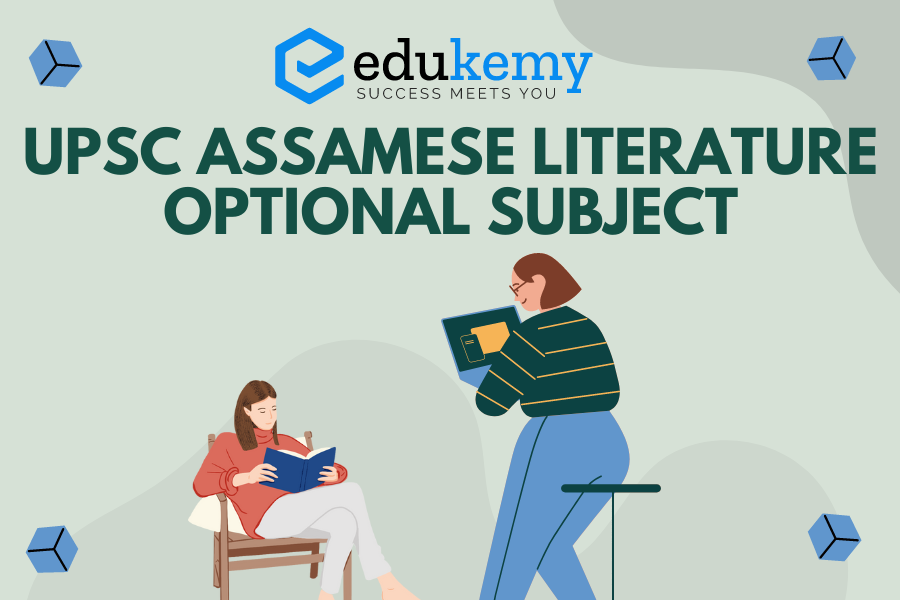
Embark on a fascinating journey through the rich tapestry of Assamese literature! As an optional subject for the UPSC Civil Services Exam, Assamese literature offers a unique opportunity to delve into the cultural and historical heart of Assam. This comprehensive syllabus delves into the very essence of the Assamese language, exploring its origins, development, and unique grammatical structures. Furthermore, you’ll engage with the literary giants of Assam, analyzing their works within the context of historical periods, from the Bhakti movement to the contemporary era. So, if you possess a passion for Assamese language and culture, and are seeking an optional subject that unlocks a vibrant literary tradition, then Assamese literature awaits!
Contents
- 1 ASSAMESE PAPER I
- 2 ASSAMESE PAPER II
- 3 FAQs
- 3.1 1. What are the broad areas covered in the Assamese Literature Optional Subject for UPSC?
- 3.2 2. Is knowledge of the Assamese language mandatory for taking this optional?
- 3.3 3. What are some of the prominent literary figures studied in the Assamese Literature Optional?
- 3.4 4. Are there any resources available to help prepare for the Assamese Literature Optional?
- 3.5 5. What are some tips for scoring well in the Assamese Literature Optional?
- 4 In case you still have your doubts, contact us on 9811333901.
ASSAMESE PAPER I
Section A
Language
(a) History of the origin and development of the Assamese Language —its position among the IndoAryan language—periods in its history.
(b) Development of Assamese prose.
(c) Vowels and consonants of the Assamese Language—Rules of phonetic changes with stress on Assamese coming down from Old Indo-Aryan.
(d) Assamese vocabulary—and its sources.
(e) Morphology of the language—conjugation—enclitic definitives and pleonastic suffixes.
(f) Dilectical divergences—the Standard colloquial and the Kamrupi dialect in particular.
(g) Assamese script—its evolution through the ages till 19th century A.D.
Section B
Literary Criticism and Literary History
(a) Principles of literary criticism up to New criticism.
(b) Different literary genres.
(c) Development of literary forms in Assamese.
(d) Development of literary criticism in Assamese.
(e) Periods of the literary history of Assam from the earliest beginnings, i.e. from the period of the charyyageeta with their socio-cultural background: the proto Assamese Pre-Sankaradeva— Sankaradeva—Post-Sankaradeva—Modern period (from the coming of the Britishers)—PostIndependence period. Special emphasis is to be given on the Vaisnavite period, the gonaki, and the post-independence periods.
ASSAMESE PAPER II
This paper will require first-hand reading of the texts prescribed and will be designed to test the candidate’s critical ability.
[Answers must be written in Assamese]
Section A
Râmâyana (Ayodhyâ Kânda —by Madhava Kandali only)
Pârijât-Harana —by Sankaradeva.
Râsakrîdâ —by Sankaradeva (From Kirtana Ghosa)
Bârgeet —by Madhavadeva.
Râjasûya —by Madhavadeva.
Kathâ-Bhâgavata(Books I and II) —by Baikurthanath Bhattacharyya.
Gurucarit-Kathâ (Sankaradeva’s Part only) —ed. by Maheswar Neog.
SECTION B
Mor Jeevan Soñwaran —by Lakshminath Bezbaroa.
Kripâbar BorbaruârKakatar Topola —by Lakshminath Bezbaroa.
Pratimâ —by Chandra KumarAgarwalla.
Gâonburhâ —by Padmanath GohainBarua.
Manomatî —by Rajanikanta Bordoloi.
Purani Asamîyâ Sâhitya —by Banikanta Kakati.
Kârengar Ligirî —by Jyotiprasad Agarwalla
Jeevanar Bâtat —by Bina Barva(BirinchiKumar Barua)
Mrityunjoy —by Birendrakumar Bhattacharyya
Samrât —by Navakanta Barua
FAQs
1. What are the broad areas covered in the Assamese Literature Optional Subject for UPSC?
The syllabus for Assamese Literature covers various aspects including:
- History and development of the Assamese language: its origin, position among Indo-Aryan languages, and periods in its history
- Development of Assamese prose forms
- Phonetics and phonology of the language: vowels, consonants, stress patterns, and their evolution from Old Indo-Aryan
- Vocabulary and its sources: how Assamese borrows words from other languages
- Morphology: verb conjugations, enclitic definitives, and pleonastic suffixes
- Dialects: Standard colloquial Assamese and the Kamrupi dialect in particular
- Evolution of the Assamese script through the centuries
2. Is knowledge of the Assamese language mandatory for taking this optional?
While a strong understanding of Assamese literature is crucial, the UPSC syllabus itself doesn’t explicitly state mandatory knowledge of the spoken language. However, being able to read and comprehend written Assamese will give you a significant edge in understanding the literary works and answering questions effectively.
3. What are some of the prominent literary figures studied in the Assamese Literature Optional?
The syllabus covers a range of Assamese literary figures from different periods. Some prominent names include:
- Shankardeva and Madhavadeva (founders of the Bhakti movement in Assam)
- Hemchandra Goswami (known for his epics and plays)
- Lakshminath Bezbaroa (a writer and reformer)
- Mahavir Swargiary (poet)
4. Are there any resources available to help prepare for the Assamese Literature Optional?
Yes, there are several resources available to aid your preparation. These include:
- NCERT textbooks on Assamese literature (if available in your region)
- Standard reference books by Assamese literature scholars
- Previous years’ UPSC question papers for the Assamese Literature Optional
- Assamese literature study materials from coaching institutes (if applicable)
5. What are some tips for scoring well in the Assamese Literature Optional?
Here are some tips to consider:
- Develop a strong foundation in the history and development of the Assamese language.
- Familiarize yourself with the works of major Assamese literary figures and their historical context.
- Practice close reading and analysis of literary texts.
- Improve your answer writing skills, focusing on clarity, structure, and argumentation.
- Take advantage of mock tests and answer evaluation by experienced tutors (if possible).
In case you still have your doubts, contact us on 9811333901.
For UPSC Prelims Resources, Click here
For Daily Updates and Study Material:
Join our Telegram Channel – Edukemy for IAS
- 1. Learn through Videos – here
- 2. Be Exam Ready by Practicing Daily MCQs – here
- 3. Daily Newsletter – Get all your Current Affairs Covered – here
- 4. Mains Answer Writing Practice – here

